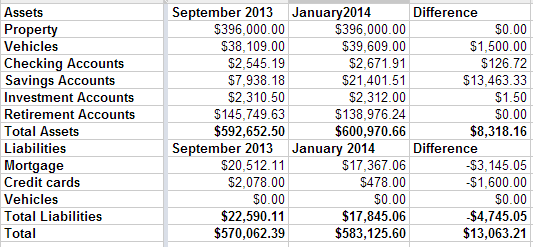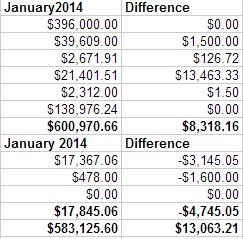- RT @MoneyMatters: Frugal teen buys house with 4-H winnings http://bit.ly/amVvkV #
- RT @MoneyNing: What You Need to Know About CSAs Before Joining: Getting the freshest produce available … http://bit.ly/dezbxu #
- RT @freefrombroke: Latest Money Hackers Carnival! http://bit.ly/davj5w #
- Geez. Kid just screamed like she'd been burned. She saw a woodtick. #
- "I can't sit on the couch. Ticks will come!" #
- RT @chrisguillebeau: U.S. Constitution: 4,543 words. Facebook's privacy policy: 5,830: http://nyti.ms/aphEW9 #
- RT @punchdebt: Why is it “okay” to be broke, but taboo to be rich? http://bit.ly/csJJaR #
- RT @ericabiz: New on erica.biz: How to Reach Executives at Large Corporations: Skip crappy "tech support"…read this: http://www.erica.biz/ #
The Library vs Amazon
A few weeks ago, I discovered the queue at my public library’s website. The process is simple: Select your books, wait a few days, then pick them up. They are available from any library in the county, delivered to my local library. That’s awesome. Much more convenient-and cheaper-than Amazon.
So I moved a couple of pages of my Amazon wish-list into the library’s queue.
I must not have been thinking, because two days later, I got an email telling me that 19 books were ready to be picked up and 10 more were in transit.
In this county, each checkout is good for 21 days. For items that don’t have a waiting list, you can reserve 3 times. That’s 12 weeks for 29 books. Hopefully, I’m up to the challenge. Please keep in mind, I’m a father of three, two of whom are in diapers, and I’m married, and I have a full time job.
I have frugally blown every second of spare time for months.
Update: This was another post written in advance. When all of the books came in, I suspended my request list. Little did I realize, the suspension cancels itself after 30 days. That was 30 more books. Whee!
Zimmerman Wins Lottery: A Prank, but What Are the Real Odds of Winning?

Satirical reports regarding George Zimmerman have been misconstrued as factual by several media outlets, which have led to the belief that the man who killed Trayvon Martin is now a multimillionaire due to a lucky lottery ticket. The improbability of the story is astounding, but the more inconceivable notion is that reporters actually believed it enough to pass it on to their audience. The origin of the hoax was the same source that profligates fake news items on a regular basis: The Onion.
was obviously meant to be disseminated as sarcasm, but the writers must feel tremendous pride in their ability to dupe the mainstream media. An unintended prank has a marvelous ability to generate a lasting reputation for the satirist. Notoriety is now something the author has in common with Zimmerman.
A stark contrast exists between lotteries and trials, and they are not equivalent. The justice system strides to avoid occurrences of random chance while lotteries promote the notion that anyone can win. The legal process is supposed to rely on evidence. Regardless of the circumstances, a victory in the courtroom has to be vigorously earned. Contrarily, there is nothing anyone can do to increase their chances in a lottery short of buying massive amounts of tickets. In a trial, the concept of reasonable doubt exists to exonerate the defendant, which should eliminate any potential for a toss-up. Courtrooms operate using evidence while lotteries are strictly statistical; therefore, the comparison is non-existent.
Even when it comes to jury selection, the process is not chaotically uncontrolled. Both sides have a general composition is mind, and they meticulously scrutinize prospective jurors as they whittle the numbers down. The pool is always sifted for bias. They are analyzed with hopes of picking people that will be sympathetically swayed towards a certain point of view. At the end, one side picked a better jury. Lotto victors cannot pick the numbers that will be responsible for their fate. Winners of lotteries do not stalk unarmed teenagers with a gun and fatally shoot them, but apparently winners of trials in Florida do.
Lotteries are often labeled as a tax for dumb people; coincidentally, this demographic is the same segment of the population that was targeted by the falsified journalism. In fact, real lottery odds are mathematically insignificant. An ABC News study declares it would take 1,684,841 years for the average lottery player to win a jackpot. Not even Zimmerman is that lucky.
Related articles
Net Worth Update – January 2014
This may be the most boring type of post I write, but it’s important to me to track my net worth so I can see my progress. We are sliding smoothly from debt payoff mode to wealth building mode.
Our highlights right now are nothing to speak of. We did let our credit card grow a little bit over the last couple of months, but paid it off completely at the end of December. It grew mostly as a matter of not paying attention while we were doing our holiday shopping and dealing with some car repairs.
That’s it. We haven’t remodeled our bathrooms yet, but we have the money sitting in a savings account, waiting for the contractor. We haven’t bought a pony yet, but we did decide that a hobby farm wouldn’t be the right move for us. We’ll be boarding the pony instead of moving, at least for the foreseeable future.
Our net worth is up $13,000 since September. Our savings are up and our retirement accounts are down because there are two inherited IRAs that we need to slowly cash out and convert to regular IRAs.

A Look Back
I’m on vacation this week and thought it would be nice to post a look back at some of my early posts. These posts are some of my favorites, but were written when there were only 3 or 4 of you paying attention.
Since I know you don’t want to miss anything, here are 5 of my favorite early posts, in no particular order:
1. Cthulhu’s Guide to Finance. I’m more than a bit of a horror geek. Books, movies, or games; all keep me entertained. Over the weekend, I taught my Mom how to play Zombie Fluxx and Gloom. When Cthulhu approached me about writing a guest post, I couldn’t refuse.
2. Birthday Parties Are Evil. It’s hard to remember to be cheap when your little girl is asking for a bowling party. It can run $200 to get a dozen kids an hour of bowling and a bit of pizza.
3. No Brakes. This is a post about why I had a hard time coming to grips with financial responsibility.
4. 4 Ways to Flog the Inner Impulse Shopper. Who can’t love a BDSM-themed personal finance post? Every blog needs a dominatrix mascot, right?
5. Fighting Evil by Phone. In which I share the method of convincing Big Nasty Telephone Company and their Contracted, Soulless Long Distance Provider to leave me the heck alone and stop demanding $800 they refused to admit was their mistake.
Resolving Legal Disputes

Dispute resolution has to do with the impartial rectification of conflict between individuals or parties. More specifically it is the utilization and execution of methods that are designed to resolve conflicts. In a case in which there is a dispute between people or groups, often times a third, neutral, party is selected to be an impartial representative for the disputing persons. Although dispute resolution can refer to resolutions both in and out of the court, it mainly applies to disputes that are settled outside of the legal framework of the judicial system.
Two of the most common types of dispute resolution are known as adjudicative and consensual. While adjudicative resolution requires a third party to mediate the outcome, such as a judge or jury, and usually involves some form of litigation, consensual resolution is the attempt to solve the issue between the two disputing parties without involving a third party, although at times a neutral arbitrator will be selected to preside over the case, though they will often be there not so much for authoritative purposes but more as a council to keep things fair. There is also a third upcoming type of dispute resolution, online dispute resolution, or ODR, which has become more popular in recent years with the rise of the internet’s prominence in daily life, but it is mainly the application of traditional consensual resolution practices, only adapted to the online environment.
Many disputes can be solved simply through adherence to the law, however, sometimes issues arise that the legal structure isn’t equipped to handle, and so a third party is chosen to resolve the conflict. These types of conflict fall within the jurisdiction of the law and so will be relegated to the political system for arbitration. Judicial resolutions are conflicts that will be, hopefully, settled by the court. In the United States, this is often the case with dispute resolution. This form of resolution usually involves litigation. This is the use of outside individuals to argue for or against the disputing parties. In a courtroom, the lawyers are the litigators, while the judge and jury listen to the arguments in order to come to their decisions.
Extrajudicial resolution is non-court settlement of conflict. Also known as alternative dispute resolution, or ADR, this is what people are usually referring to when discussing dispute resolution. ADR is usually more efficient, cost effective, and less time consuming than judicial resolutions. Extrajudicial resolution concerns various types of ways to settle conflict. These include arbitration and mediation. In arbitration neutral individuals will listen to both sides of an argument and render a decision based on evidence. Unlike the court systems, this proceeding doesn’t necessarily include a binding agreement with the parties.
Mediation is used in extrajudicial resolution as a way to open a dialogue between conflicting parties. The idea is to use a trained neutral third party in order to come up with unique solutions to solve the issue. A mediator is trained to be both an effective negotiator as well as an excellent communicator. A mediator is like a judge in that they cannot take sides, and they do not give legal advice either. Their decisions are not obligatorily followed, though they tend to be followed since the mediators are trained to make decisions that benefit both parties.
The techniques used in dispute resolution can be used both in and outside of the court room. It is often used by individuals who wish to speed up the process by not having to get into the political system. However, they are useful in many cases where individuals wish to come to the most beneficial agreement for all the parties involved.








